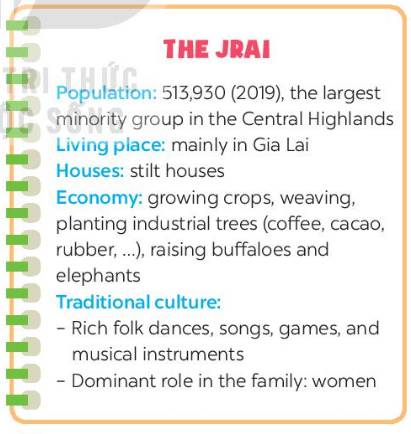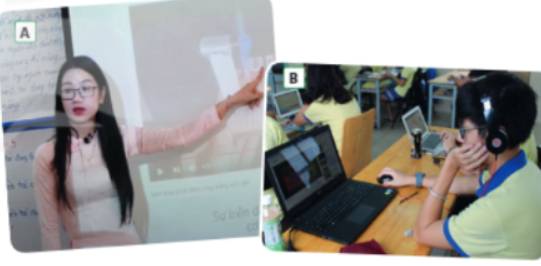Work in pairs. Take turns to ask and answer the questions in exercise 4. Answer in complete sentences.
Hãy nhập câu hỏi của bạn vào đây, nếu là tài khoản VIP, bạn sẽ được ưu tiên trả lời.


1. It happened on December 24th last year at my sister's house.
2. We were celebrating Christmas and my niece's birthday.
3. I was wearing a jacket, a long white dress and a black boots.
4. I felt so merry and excited at that time
1. It happened on December 24th last year at my sister's house.
2. We were celebrating Christmas and my niece's birthday.
3. I was wearing a jacket, a long white dress and a black boots.
4. I felt so merry and excited at that time.

1. Did you watch TV? What did you watch? (Bạn có xem TV không? Bạn đã xem gì?)
Yes, I did. I watch the finale of America Masterchef. (Có, tôi xem trận chung kết của Vua đầu bếp Mỹ.)
2. Did you go out on Friday or Saturday evening? Where did you go? (Bạn có ra ngoài vào tối thứ Sáu hay thứ Bảy không? Bạn đã đi đâu?)
Yes, I went to the art galley on Friday evening. (Có, mình đến phòng trưng bày nghệ thuật vào tối thứ sáu.)
3. Did you see anyone on Saturday or Sunday? Who did you see? (Bạn có thấy ai vào thứ Bảy hay Chủ nhật không? Bạn đã thấy ai?)
I came across some of my old friends while visiting my grandparents on Sunday. (Mình vô tình gặp lại mấy người bạn cũ trong lúc đi thăm ông bà vào Chủ nhật.)
4. Did you do any homework? When did you do it? (Bạn có làm bài tập chưa? Bạn đã làm nó khi nào?)
Yes I did. I completed all my homework last night. (Mình làm rồi. Mình đã làm xong tất cả bài tập vào tối qua.)
5. Did you play computer games? Which games did you play? (Bạn có chơi trò chơi trên máy tính không? Bạn chơi trò gì?)
I have never played computer games before. (Mình chưa bao giờ chơi trò chơi điện tử trên máy tính cả.)
6. Did you do any sport? What sport did you do? (Bạn có chơi thể thao không? Bạn chơi môn thể thao nào?)
I have been playing badminton for almost 3 years. (Có, mình đã chơi cầu lông ngót nghét 3 năm ròng.)

Tham khảo :
1. If you found 5 million VND in the street, what would you do?
If I found 5 million VND in the street, I’d give it to the police.
2. If you saw someone in danger, what would you do?
If I saw someone in danger, I'd call the police.
3. If you met your idol, what would you do?
If I met my idol, I'd take a selfie with them.
4. If you suddenly became rich, what would you do?
If I suddenly became rich, I'd donate to poor people.
If I saw someone in danger, I would call for help or try to assist them if it was safe to do so.
If I met my idol, I would probably be starstruck and speechless at first, but then I would try to express my admiration and gratitude for their work.
If I suddenly became rich, I would first make sure to secure my financial future by investing wisely and seeking professional advice. Then, I would use some of the money to fulfill my dreams and goals, as well as help my family and contribute to charitable causes.
$HaNa$

Mô tả tranh
A: In picture A, a teacher is standing in front of the class and appears to be teaching a lesson
B: Picture B, on the other hand, shows a student working on a laptop wearing headphones in the classroom. It looks like the student is working on an individual task.
A: It's interesting to see how technology is being used in the classroom in both pictures. In picture A, the teacher is likely using a whiteboard or projector to help illustrate their lesson, while in picture B, the student is using a laptop to complete their work.
B: Yes, that's a good point. It seems like technology is becoming more integrated into the classroom, allowing for more individualized learning and different modes of teaching.
A: Another difference is the level of interaction between the teacher and students. In picture A, the teacher is leading the lesson, while in picture B, the student is working independently.
B: That's true. However, it's important to note that both forms of learning and teaching have their advantages and disadvantages, and it ultimately depends on the goals and needs of the students.
(A: Trong hình A, một giáo viên đang đứng trước lớp và có vẻ như đang giảng bài
B: Mặt khác, hình B cho thấy một học sinh đang làm việc trên máy tính xách tay đeo tai nghe trong lớp học. Có vẻ như học sinh đang làm một nhiệm vụ cá nhân.
A: Thật thú vị khi xem cách công nghệ được sử dụng trong lớp học trong cả hai bức tranh. Trong hình A, giáo viên có thể đang sử dụng bảng trắng hoặc máy chiếu để giúp minh họa bài học của họ, trong khi ở hình B, học sinh đang sử dụng máy tính xách tay để hoàn thành bài tập của mình.
B: Vâng, đó là một điểm tốt. Có vẻ như công nghệ đang được tích hợp nhiều hơn vào lớp học, cho phép học tập cá nhân hóa hơn và các phương thức giảng dạy khác nhau.
A: Một điểm khác biệt nữa là mức độ tương tác giữa giáo viên và học sinh. Ở hình A, giáo viên đang dẫn dắt bài học, còn ở hình B, học sinh đang làm việc độc lập.
B: Đúng vậy. Tuy nhiên, điều quan trọng cần lưu ý là cả hai hình thức học tập và giảng dạy đều có những ưu điểm và nhược điểm, và cuối cùng nó phụ thuộc vào mục tiêu và nhu cầu của học sinh.)
Bài tham khảo trả lời 2 câu hỏi
A: Do you think technology sometimes makes it harder for people to communicate with each other? Why?
B: Yes, technology can sometimes make it harder for people to communicate because it can create misunderstandings, cultural differences, and language barriers. Additionally, technology can also create some places where people only interact with like-minded individuals and ignore diverse perspectives, leading to polarization and division.
A: Do you agree that in the modern world, science is a more important subject than languages? Give reasons.
B: Both science and languages are important subjects in the modern world, and they play different roles. Science helps us understand the natural world, solve problems, and create new technologies, while languages facilitate communication and understanding among people from different cultures and backgrounds. The importance of each subject depends on one's personal and professional goals, interests, and needs.
Tạm dịch
A: Bạn có nghĩ rằng công nghệ đôi khi khiến mọi người khó giao tiếp với nhau hơn không? Tại sao?
B: Đúng vậy, công nghệ đôi khi có thể khiến mọi người khó giao tiếp hơn vì nó có thể tạo ra sự hiểu lầm, khác biệt về văn hóa và rào cản ngôn ngữ. Ngoài ra, công nghệ cũng có thể tạo ra các nơi nơi mà mọi người chỉ tương tác với những cá nhân có cùng chí hướng và bỏ qua các quan điểm đa dạng, dẫn đến sự phân cực và chia rẽ.
A: Bạn có đồng ý rằng trong thế giới hiện đại, khoa học là một môn học quan trọng hơn ngôn ngữ không? Đưa ra lý do.
B: Cả khoa học và ngôn ngữ đều là những môn học quan trọng trong thế giới hiện đại và chúng đóng những vai trò khác nhau. Khoa học giúp chúng ta hiểu thế giới tự nhiên, giải quyết vấn đề và tạo ra công nghệ mới, trong khi ngôn ngữ tạo điều kiện giao tiếp và hiểu biết giữa những người từ các nền văn hóa và nguồn gốc khác nhau. Tầm quan trọng của mỗi môn học phụ thuộc vào mục tiêu, sở thích và nhu cầu cá nhân và nghề nghiệp của mỗi người.

Bài tham khảo
A: Which person from history do you look up to?
B: I look up to Mahatma Gandhi because he fought for India's independence through non-violence.
A: Why do you look up to him?
B: I admire his leadership and his commitment to justice and peace.
(A: Người nào trong lịch sử mà bạn ngưỡng mộ?
B: Tôi ngưỡng mộ Mahatma Gandhi vì ông đã đấu tranh cho nền độc lập của Ấn Độ thông qua bất bạo động.
A: Tại sao bạn lại ngưỡng mộ anh ấy?
B: Tôi ngưỡng mộ khả năng lãnh đạo và cam kết của ông ấy đối với công lý và hòa bình.)
A: Which food or habit would you like to give up?
B: I would like to give up eating junk food.
A: Why do you want to give it up?
B: I want to have a healthier diet and avoid health problems in the future.
(A: Bạn muốn từ bỏ món ăn hay thói quen nào?
B: Tôi muốn từ bỏ việc ăn đồ ăn vặt.
A: Tại sao bạn lại muốn từ bỏ nó?
B: Tôi muốn có một chế độ ăn uống lành mạnh hơn và tránh các vấn đề sức khỏe trong tương lai.)
A: If you could take after a famous person, who would you choose?
B: I would like to take after Elon Musk because of his vision and innovation.
A: Why would you want to take after him?
B: I think he has achieved a lot in his career and is always pushing the boundaries of what's possible.
(A: Nếu được giống một người nổi tiếng, bạn sẽ chọn ai?
B: Tôi muốn giống Elon Musk vì tầm nhìn và sự đổi mới của ông ấy.
A: Tại sao bạn lại muốn giống ông ấy?
B: Tôi nghĩ ông ấy đã đạt được rất nhiều thành tựu trong sự nghiệp của mình và luôn vượt qua ranh giới của những gì có thể.)
A: Have you ever come across some money in the street? If so, what did you do when you picked it up?
B: Yes, I found some money on the sidewalk once. I picked it up and looked around to see if anyone had dropped it, but no one was around. So I kept it and donated it to a local charity.
A: Why did you donate it?
B: I didn't feel right keeping something that wasn't mine, and I wanted to do something good with it.
(A: Bạn đã bao giờ bắt gặp một số tiền trên đường phố chưa? Nếu vậy, bạn đã làm gì khi bạn nhặt nó lên?
B: Vâng, tôi đã từng nhặt được một số tiền trên vỉa hè. Tôi nhặt nó lên và nhìn quanh xem có ai đánh rơi không, nhưng không có ai xung quanh. Vì vậy, tôi đã giữ nó và tặng nó cho một tổ chức từ thiện địa phương.
A: Tại sao bạn tặng nó?
B: Tôi cảm thấy không ổn khi giữ một thứ không phải của mình và tôi muốn làm điều gì đó tốt đẹp với nó.)
A: Which member of your family do you care after?
B: I care after my younger sister.
A: In what way do you care after her?
B: Well, I help her with her homework, drive her to and from school, and make sure she eats healthy meals.
(A: Thành viên nào trong gia đình bạn được bạn chăm sóc?
B: Tôi chăm sóc cho em gái của tôi.
A: Bạn chăm sóc cô ấy theo cách nào?
B: Chà, tôi giúp cô ấy làm bài tập về nhà, đưa đón cô ấy đi học và về nhà, và đảm bảo rằng cô ấy ăn những bữa ăn lành mạnh.)

I think that I wouldn’t like to work as a farmer as I’m not willing to work outdoors. You have to work all day in the field and I don’t feel like spending my day with different kind of animal. Moreover, it is quite low-paid. I’m quite interested in being a receptionist. The salary is really much. However, I won’t apply for this job as I’m not good at communicating. So that it would be hard for me to deal with the public and serve customers. I think working as a bartender is really awesome. In my view, this is a creative and rewarding jobs. I also have experiences in making cocktails and other beverages. I suppose that being a bartender would be the best for me, though it’s not so well-paid as being a receptionist.
(Tôi nghĩ rằng tôi không thích làm công nhân nông trường vì tôi không sẵn sàng làm việc ngoài trời. Bạn sẽ phải làm việc cả ngày trên nông trường và tôi không thích dành cả ngày với động vật. Hơn nữa, họ trả lương khá thấp. Tôi khá thích thú với công việc tiếp tân. Họ trả lương rất cao. Tuy nhiên, tôi sẽ không ứng tuyển công việc này vì tôi không giỏi giao tiếp. Vậy sẽ khó cho tôi khi giải quyết công việc và phục vụ khách hàng. Tôi thấy là làm nhân viên pha chế rất là ngầu. Theo tôi thì công việc này rất là sáng tạo và bổ ích. Hơn nữa tôi cũng đã có kinh nghiệp pha chế cocktails và các loại đồ uống khác. Tôi nghĩ trở thành nhân viên pha chế sẽ là tốt nhất với tôi.)

Tham khảo:
- How much food did you eat last night?
Not much. I just ate some bread.
- What did you do last weekend?
I went to the zoo with my brother.
- Who are they?
They are my best friends.
- Where did you have lunch?
I had lunch at home.
- Why were you so happy yesterday?
I got good marks.

Bài tham khảo
A: If you'd felt ill this morning, what would you have done?
B: If I’d felt ill this morning, I would have stayed at home and rested.
A: If there hadn't been school last Friday, what would you have done?
B: If there hadn't been school last Friday, I would have gone to the beach.
A: If you’d felt hungry on the way home from school yesterday, what would you have eaten?
B: If I'd felt hungry on the way home from school yesterday, I would have bought a sandwich or a snack.
A: If I'd forgotten to do my homework at the weekend, what would have happened?
B: If you'd forgotten to do your homework at the weekend, you would have got a lower grade or failed the assignment.
A: If I hadn't studied English in primary school, what would I be doing now?
B: If you hadn't studied English in primary school, you might not have been able to understand or speak to me in English now.
A: If I'd been late for school this morning, what would I have missed?
B: If you'd been late for school this morning, you would have missed the first lesson or the school assembly.
Tạm dịch
A: Nếu bạn cảm thấy ốm sáng nay, bạn sẽ làm gì?
B: Nếu tôi cảm thấy ốm sáng nay, tôi sẽ ở nhà và nghỉ ngơi.
A: Nếu không có tiết học vào thứ Sáu tuần trước, bạn sẽ làm gì?
B: Nếu thứ sáu tuần trước không đi học thì tôi đã đi biển rồi.
A: Nếu bạn cảm thấy đói trên đường đi học về ngày hôm qua, bạn sẽ ăn gì?
B: Nếu tôi cảm thấy đói trên đường từ trường về nhà ngày hôm qua, tôi sẽ mua một chiếc bánh sandwich hoặc đồ ăn nhẹ.
A: Nếu tôi quên làm bài tập về nhà vào cuối tuần, điều gì sẽ xảy ra?
B: Nếu bạn quên làm bài tập về nhà vào cuối tuần, bạn sẽ bị điểm thấp hoặc trượt bài tập.
A: Nếu tôi không học tiếng Anh ở trường tiểu học, tôi sẽ làm gì bây giờ?
B: Nếu bạn không học tiếng Anh ở trường tiểu học, bạn có thể không hiểu hoặc nói chuyện với tôi bằng tiếng Anh bây giờ.
A: Nếu sáng nay tôi đi học muộn, tôi sẽ bỏ lỡ điều gì?
B: Nếu sáng nay bạn đi học muộn, bạn sẽ bỏ lỡ buổi học đầu tiên hoặc buổi tập trung của trường.



1. What are the latest books made?
The latest books are made into cakes.
2. Where are the latest books displayed?
The latest books was displayed at events all over the world.
3. Was series of three books The Hunger Games adapted for film?
Yes, it was. The Hunger Games is a series of three books that was adapted for film.
4. Who was the film made?
It was made by Crystal Watanabe.
5. Are the books eaten?
Yes, they are. The books are eaten.